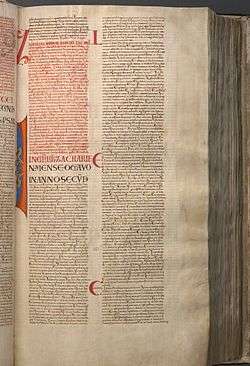Zechariah 2
| Zechariah 2 | |
|---|---|
 The beginning part of the Book of Zechariah (1:1-6:15) in Latin in Codex Gigas, made around 13th century. | |
| Book | Book of Zechariah |
| Bible part | Old Testament |
| Order in the Bible part | 38 |
| Category | Nevi'im |
Zechariah 2 is the second chapter of the Book of Zechariah in the Hebrew Bible or the Old Testament of the Christian Bible.[1][2] This book contains the prophecies spoken by the prophet Zechariah, and is a part of the Book of the Twelve Minor Prophets.[3][4]
Text
- The original text is written in Hebrew language.
- This chapter is divided into 13 verses.
Textual versions
Some most ancient manuscripts containing this chapter in Hebrew language:
- Masoretic Text (10th century)
- Dead Sea Scrolls: (2nd century BC)[5][6]
- 4Q80 (4QXIIe): extant: verses 6-10 (verses 10‑14 in Masoretic verse numbering)[5]
Ancient translations in Koine Greek:
- Septuagint (3rd century BC)
- Dead Sea Scrolls: (2nd century BC)[5]
- Naḥal Ḥever (8ḤevXIIgr): extant: verses 3-5, 7-8, 12-13 (verses 7‑9, 11‑12, 16‑17 in Masoretic verse numbering)[5]
- Theodotion version (~AD 180)
Structure
NKJV groups this chapter into:
- Zechariah 2:1-5 = Vision of the Measuring Line
- Zechariah 2:6-13 = Future Joy of Zion and Many Nations
Verse 10
- Sing and rejoice, O daughter of Zion:
- for, lo, I come, and I will dwell in the midst of thee,
- saith the Lord.[7]
- "Lo, I come": Septuagint, ἰδοὺ ἐγὼ ἔρχομαι, So Christ is called, ὁ ἐρχόμενος, "he that cometh" (Matthew 11:3).[8]
- "and I will dwell in the midst of thee, saith the Lord": the presence of Christ in his churches, and with his people, in attendance on his word and ordinances, will be very manifest and constant in the latter day.[9] As John saith, "The Word was made Flesh and dwelt among us" John 1:14; and, "Behold the tabernacle of God is with men, and He will dwell with them, and they shall be His people, and God Himself shall be with them and shall be their God" Revelation 21:3.[10] Thus, primarily at Messiah's first advent (Psalm 40:7; John 1:14; Colossians 2:9; 1 Timothy 3:16);[11] more fully at His second advent (Isaiah 40:10). So Zechariah 9:9, Isaiah 12:6; Ezekiel 37:27; Zephaniah 3:14.[11] Meanwhile, God dwells spiritually in His people (2Co 6:16).[11]
Verse 11
- And many nations shall be joined to the Lord in that day,
- and shall be my people:
- and I will dwell in the midst of thee,
- and thou shalt know that the Lord of hosts hath sent me unto thee.[12]
- "Many nations shall be joined to the Lord": ("shall be joined" = "shall join themselves"); "shall fly for refuge unto the Lord" (Septuagint);[8] "cleaving to Him by a close union".[10] Isaiah had so spoken of single proselytes Isaiah 56:3-6; Jeremiah had used the word of Israel's self-exhortation after the return from Babylon; "going and weeping," they shall go and seek the Lord their God, saying, "Come and let us join ourselves unto the Lord, in a perpetual covenant that shall not be forgotten" Jeremiah 50:4-5. This Zechariah now predicts of "many nations." The Jews were scarcely half-restored themselves, a mere handful. They had wrought no conversions among the pagan, yet prophecy continues its unbroken voice, "many nations shall join themselves unto the Lord."[10]
- "My people": "unto me for a people"; Septuagint, "shall be unto him for a people" (compare Zechariah 8:20). No mere conversion of individuals among the heathen satisfies this promise. Whole nations shall become the Lord's people. That title shall be shared with Israel by countless multitudes (compare Isaiah 2:2, 3; Isaiah 11:10; Micah 4:2; Zephaniah 2:11),[8]
- "Sent me unto thee": "unto thee" is here added to the same formula (Zechariah 2:9). Zion first shall "know (generally) that Jehovah of hosts hath sent" Messiah, by the judgments inflicted by Him on her foes. Subsequently, she shall know experimentally the particular sending of Messiah unto her. Jehovah here says, "I will dwell," and then that Jehovah of hosts sent Him; therefore Jehovah the Sender and Jehovah the Sent must be One.[11]
See also
- Related Bible parts: Isaiah 2, Isaiah 11, Micah 4, Zephaniah 2, Haggai 1, Haggai 2, Zechariah 1, Zechariah 3, Zechariah 4, Zechariah 5, Zechariah 6, John 1, Revelation 21
Notes and references
- ↑ Collins 2014.
- ↑ Hayes 2015.
- ↑ Metzger, Bruce M., et al. The Oxford Companion to the Bible. New York: Oxford University Press, 1993.
- ↑ Keck, Leander E. 1996. The New Interpreter's Bible: Volume: VII. Nashville: Abingdon.
- 1 2 3 4 Dead sea scrolls - Zechariah
- ↑ Timothy A. J. Jull; Douglas J. Donahue; Magen Broshi; Emanuel Tov (1995). "Radiocarbon Dating of Scrolls and Linen Fragments from the Judean Desert". Radiocarbon. 38 (1): 14. Retrieved 26 November 2014.
- ↑ Zechariah 2:10
- 1 2 3 Joseph S. Exell; Henry Donald Maurice Spence-Jones (Editors). The Pulpit Commentary. 23 volumes. First publication: 1890.

- ↑ John Gill. John Gill's Exposition of the Entire Bible. Exposition of the Old and New Testament. Published in 1746-1763.

- 1 2 3 Barnes, Albert. Notes on the Old Testament. London, Blackie & Son, 1884. Reprint, Grand Rapids: Baker Books, 1998.

- 1 2 3 4 Robert Jamieson, Andrew Robert Fausset; David Brown. Jamieson, Fausset, and Brown's Commentary On the Whole Bible. 1871.

- ↑ Zechariah 2:11
Bibliography
- Collins, John J. (2014). Introduction to the Hebrew Scriptures. Fortress Press.
- Hayes, Christine (2015). Introduction to the Bible. Yale University Press.
External links
Jewish
Christian
This article is issued from
Wikipedia.
The text is licensed under Creative Commons - Attribution - Sharealike.
Additional terms may apply for the media files.